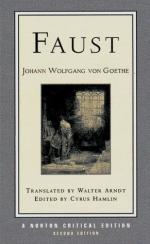|
This section contains 1,060 words (approx. 4 pages at 300 words per page) |

|
FAUST. In sixteenth-century Europe, Faust was reviled as a godless man who, as a consequence of making a pact with the Devil, met a gruesome yet appropriate fate. By the nineteenth century, he had become the archetypal Romantic hero; the term Faustian, coined by Oswald Spengler (1880–1936), was taken as a positive epithet to describe those tormented, defiant individuals who strive for more than is humanly possible. Whether condemned or condoned, Faust is the protagonist of an enduring story that embodies fundamental religious and philosophical questions about humanity's place in the universe, the nature of good and evil, and the limitations of human knowledge.
The Historical Faust
Between 1507 and 1540, numerous references appear in German diaries, letters, and records to an unsavory character with the last name of Faust. The picture that emerges is of a fairly well educated man: He may have been the Johann Faust listed in the...
|
This section contains 1,060 words (approx. 4 pages at 300 words per page) |

|


